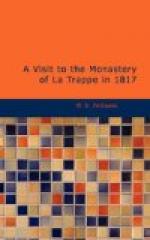The climate of Nantes is mild, and reckoned remarkably healthy: every article of life is cheap, and from its mild temperature it abounds in the finest fruits and most excellent wines. Its population is estimated at 60,000 inhabitants. The numbers that were destroyed during the Revolution, or, as the French emphatically term it, “Le regne de la Terreur,” were never ascertained; but the frightful history of that bloody period would probably justify the computation at half the number of its present population, many having fallen victims to the murders that were termed “Noyades,” independent of those who perished in the Vendean war.
The spot where the gallant Charette was shot, with several other leaders of the Vendean army, is shown; and in the cemetery, a large mound of earth marks the place where the bodies were thrown in, at the time of the “Fuzillades” when the infamous Carrier presided at the execution of the brave Royalists.[7] The print beneath represents this monster on the banks of the Loire directing the Noyades.
[Illustration]
[Footnote 7: Chaque nuit on venait en prendre par centaines, pour les mettre sur les bateaux. La on liait les malheureux deux a deux, et on les poussait dans l’eau a coups de baionette. On saisissait indistinctement tout ce qui se trouvait a l’entrepot, tellement qu’on noya un jour l’etat major d’une corvette Anglaise, qui etait prisonnier de guerre. Une autre fois, Carrier, voulant donner un exemple de l’austerite des moeurs republicaines, fit enfermer trois cent filles publiques de la ville, et les malheureuses creatures furent noyees. Enfin, l’on estime qu’il a peri a l’entrepot quinze mille personnes en un mois.—Memoires de Madame la Marquise de Laroche-Jaquelin.]
At the end of a fine avenue of trees, on the Boulevard, is a large and splendid mansion built by that Deputy, and which is at present inhabited by a merchant. Carrier’s mistress (to whom he left it, together with a very considerable fortune, amassed from the spoils of his plunder, and the murder of the innocent inhabitants) was very lately sentenced to two years’ hard labour for some crime she had committed: and it is no less remarkable, that, of the remaining inhabitants known to have participated in the atrocities of that frightful period, there is not one but is reduced to poverty, and most of them in the extreme of wretchedness, shunned by all, and suffering the ignominy they have so justly merited!
CHAP. V.
COUNTRY SOUTH OF THE LOIRE.—LE BOCAGE.—CLISSON.—HISTORICAL ANECDOTES.—THE GARENNE, AND RIVER SEVRES.




